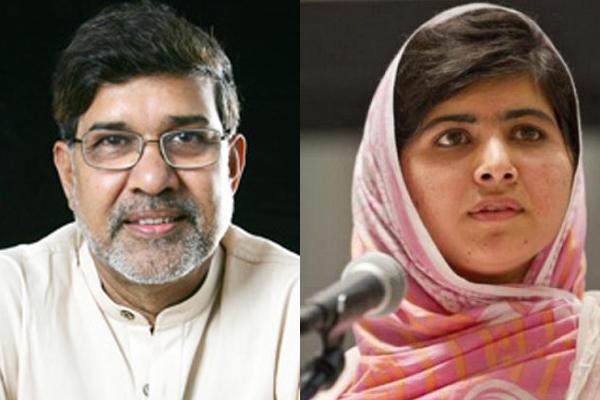 NIL
NIL
India's Kailash Satyarthi, Pakistan's Malala get Nobel Peace Prize
Stockholm, Oct 10 (IBNS) The Nobel Peace Prize 2014 was awarded jointly to Kailash Satyarthi of India and Malala Yousafzay of Pakistan "for their struggle against the suppression of children and young people and for the right of all children to education".
The Norwegian Nobel Committee said: "Children must go to school and not be financially exploited. In the poor countries of the world, 60% of the present population is under 25 years of age. It is a prerequisite for peaceful global development that the rights of children and young people be respected. In conflict-ridden areas in particular, the violation of children leads to the continuation of violence from generation to generation."
Showing great personal courage, Kailash Satyarthi, maintaining Gandhi’s tradition, has headed various forms of protests and demonstrations, all peaceful, focusing on the grave exploitation of children for financial gain. He has also contributed to the development of important international conventions on children’s rights.
Despite her youth, Malala Yousafzay has already fought for several years for the right of girls to education, and has shown by example that children and young people, too, can contribute to improving their own situations. This she has done under the most dangerous circumstances. Through her heroic struggle she has become a leading spokesperson for girls’ rights to education.
The Nobel Committee regards it as an important point for a Hindu and a Muslim, an Indian and a Pakistani, to join in a common struggle for education and against extremism. Many other individuals and institutions in the international community have also contributed. It has been calculated that there are 168 million child labourers around the world today. In 2000 the figure was 78 million higher. The world has come closer to the goal of eliminating child labour.
The struggle against suppression and for the rights of children and adolescents contributes to the realization of the “fraternity between nations” that Alfred Nobel mentions in his will as one of the criteria for the Nobel Peace Prize.
Top Headlines
-
News
India to roll out vehicle-to-vehicle communication technology by 2026 to boost road safety
January 08, 2026
-
News
Qualitatively different: Supreme Court shuts bail door on Umar Khalid, Sharjeel Imam in Delhi riots case
January 05, 2026
-
News
Kolkata CP urges elderly to stay alert against digital scams at Pronam interaction
January 03, 2026
-
News
New Year gift for rail passengers! PM Modi to flag off first Vande Bharat sleeper in January all details
January 02, 2026
-
News
Hindu man stabbed and set ablaze in Bangladesh survives by jumping into pond; fourth attack in two weeks
January 01, 2026
-
News
Sona Incubations, Salem picks 17 startups for Rs 11 Mn DST investment, grant
December 30, 2025
-
News
Visva-Bharati University unveils a transformational roadmap under Vice-Chancellor Dr. Probir Kumar Ghosh
December 29, 2025
-
News
Reject Macaulayan education, reclaim Indian values: H M Bangurs big World Hindu Economic Forum pitch
December 21, 2025
-
News
Horror in Bangladesh: Hindu man lynched and set on fire amid violent protests
December 19, 2025
-
News
Buried at home: UP man arrested for killing wife, two daughters over burqa dispute
December 18, 2025





